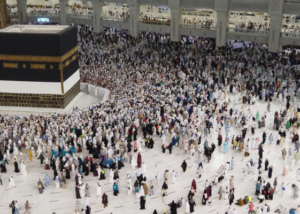What is the ruling in the Shafi’i Madhab on gatherings for the remembrance of the martyrdom of Imam Husayn in Muharram (Karbala)?
Quran
Hadith
Islamic Text
Praise be to Allah, and may His Salutations and Peace be upon our Master Muhammad ﷺ, his believers and Companions.
In order to understand the rulings concerning this question, it is important for the reader to understand the status of all the Companions of the Messenger of Allah ﷺ; therefore, I will begin by providing a brief summary of what Allah and His Messenger ﷺ mention with regards to them.
The Companions of the Messenger of Allah ﷺ are all, without exception, highly regarded and honoured in Islam. Allah explicitly highlights their lofty status and honour in many verses in the Holy Qur’an. For instance, He says,
لَّقَدْ رَضِىَ ٱللَّهُ عَنِ ٱلْمُؤْمِنِينَ إِذْ يُبَايِعُونَكَ تَحْتَ ٱلشَّجَرَةِ فَعَلِمَ مَا فِى قُلُوبِهِمْ فَأَنزَلَ ٱلسَّكِينَةَ عَلَيْهِمْ وَأَثَـٰبَهُمْ فَتْحًا قَرِيبًا
“Indeed, Allah was pleased with the believers when they pledged allegiance to you ˹O Prophet˺ under the tree. He knew what was in their hearts, so He sent down serenity upon them and rewarded them with a victory at hand” (al-Fath:18)
Here, Allah announces that He is pleased with the believers who pledged allegiance to the Messenger of Allah ﷺ. These believers are the Companions of the Messenger of Allah ﷺ who have all achieved the pleasure of Allah, as is explicitly evident from Allah’s statement aforementioned, during their lifetime which is the ultimate goal of any believer in Allah and His Messenger ﷺ.
In addition, Imam al-Bukhari, may Allah have mercy on him, reports in his Sahih on the authority of Abd-Allah b. Mas’ud, may Allah be pleased with him, that the Messenger of Allah ﷺ said,
خَيْرُ النَّاسِ قَرْنِي، ثُمَّ الَّذِينَ يَلُونَهُمْ، ثُمَّ الَّذِينَ يَلُونَهُمْ
“The best of mankind is my generation, then those that follow after them, then those that follow after them…” (Hadith no. 6429)
This statement of the Messenger of Allah ﷺ further illustrates the greatness of his Companions who have been described by the Messenger of Allah ﷺ, who only speaks the truth with divine inspiration from Allah, as the best of all mankind generations that have lived, and will live, on the face of this earth.
The Messenger of Allah ﷺ also warns against anything that may lead to cursing or dishonoring any of his Companions. Imam al-Bukhari, may Allah have mercy on him, reports on the authority of Abu Sa’id al-Khudri, may Allah be pleased with him, that the Messenger of Allah ﷺ said,
لا تَسُبُّوا أصْحابِي؛ فلوْ أنَّ أحَدَكُمْ أنْفَقَ مِثْلَ أُحُدٍ ذَهَبًا، ما بَلَغَ مُدَّ أحَدِهِمْ ولا نَصِيفَهُ
“Do not curse my Companions. If one of you were to spend in gold the amount that equates to Mount Uhud, it would not equate to a handful, nor even half a handful, of one of them.” (Hadith no. 3673)
Imam Shihab’ud-Din ar-Ramli (d. 957) was asked regarding whether the love of our Master Abu Bakr and all of the Companions is an obligation or not. He responded,
محبتهم واجبة إذ يجب تعظيمهم لأن الله تعالى عظمهم و أثنى عليهم في غير موضع من كتابه إلخ
“Loving them is an obligation as revering them is an obligation. This is because Allah, Most High, exalted them and praised them in many places in His Book….” (Fatawa’ar-Ramli, pg. 665, 2nd Edition, DKI 2012)
Imam ar-Ramli, may Allah have mercy on him, then continued to cite various verses of the Holy Qur’an and traditions of the Messenger of Allah ﷺ to emphasise the obligation of loving all the Companions of the Messenger of Allah ﷺ.
There are many more verses in the Holy Qur’an and traditions of the Messenger of Allah ﷺ that further confirm the unique status of all the Companions of the Messenger of Allah ﷺ, but I will suffice with the aforementioned and proceed with discussing the question at hand.
Imam Yusuf al-Ardabili (d. 779) states in Al-Anwar,
قال الغزالي وغيره وحرم على الواعظ وغيره رواية مقتل الحسن والحسين رضي الله عنهما وحكاياته وما جرى بين الصحابة من التشاجر التخاصم فإنه مهيج على بغض الصحابة والطعن فيهم وهم أعلام الدين تلقى الأئمة الدين منهم رواية ونحن من الأئمة دراية فالطاعن فيهم مطعون طاعن في نفسه ودينه هـ
“Al-Ghazali and others said, ‘It is prohibited for the one giving an admonition or anyone else to narrate the murder of al-Hasan and al-Husayn, may Allah be pleased with them both, or discuss it as well as any quarrel or dispute that took place between the Companions as this can stir emotions that lead to hating the Companions and insulting them. They [the Companions] are the representatives of the religion, and the scholars have received the matters of religion through them by narration and we have understood the religion from these scholars. Therefore, the one who insults them is cursed, essentially insulting himself and his religion.” (Al-Anwar li’amal’il-abrar, Vol. 3, pg. 270, Dar ad-Dhiya’ 2006)
We can immediately gather from this text the prohibition, and reasoning of this prohibition, of narrating the tragedies that took place in the murder of our Masters al-Hasan and al-Husayn, may Allah be pleased with them both. This text alone is sufficient, in the Shafi’i school, as a warning to holding gatherings specifically to narrate or discuss these particular tragedies or any quarrel that may have taken place amongst the Companions, may Allah be pleased with them all.
However, if a scholar was to write a book or gather people to remove doubts and issues that may have been raised in this regard, then this is something that is an obligation on the scholar. This can be gathered from the words of Imam Ahmad b. Hajar al-Haytami (d. 974), may Allah have mercy on him, where he states in a book he wrote to highlight the many virtues of Mu’awiyah and ‘Ali, may Allah be pleased with them both,
أن ذكر هذه المباحث السابقة واللاحقة لا ينافي ما أطبق عليه أئمة الأصول وغيرهم أن يمسك عما شجر بين الصحابة رضي الله عنهم إلخ
“The discussions in the previous and coming chapters do not contradict what the scholars of Usul and others have unanimously agreed upon, to withhold from delving into quarrel between the Companions, may Allah have mercy on them….” (Fada’il Mu’awiyah, pg. 139, Dar al-Lubab 2017)
This shows that a scholar who gathers people to remove doubts and concerns, in accordance to the principles of the Sunni schools of creed and jurisprudence, does not fall into the prohibition mentioned earlier. In fact, they are obliged to do this as it is their role to protect the Muslim nation from ideas of falsehood and corruption.
Shaykh ‘Abd-Rahman al-Mash-hur (d. 1320) cites a fatwa of Shaykh ‘Abd-Allah b. ‘Umar b. Yahya (d.1265), may Allah have mercy on them both, where Shaykh Bin Yahya says,
العمل بيا حسين في جهة الهند وجاوه المفعول يوم عاشوراء أو قبله أو بعده بدعة مذمومة شديدة التحريم وفاعله فساق وضلال متشبهون بالرافضة والناصبة إلخ
“The performance of ‘Ya Husayn’ that is done in a region of India and Jawa on ‘Ashura day, or even before it or after it, is a blameworthy innovation and severe prohibition. Those who do this are sinners, misguided and imitate the Rafidah and Nasibah….” (al-Bughyat’ul-Mustarshidin, Vol. 2, pg. 804, Dar ad-Diya’ 2017)
Although it is unclear to me as to what Shaykh Bin Yahya is referring to with ‘Ya Husayn’, what we can gather from this text is the warning of imitating the sects who hold gatherings of Karbala. Certain sects hold gatherings of mourning, or celebrating, the tragedy of the murder of al-Husayn, may Allah be pleased with him, on ‘Ashura day; therefore, imitating them in mourning, or celebrating, is also prohibited.
In summary, it is clear that holding gatherings, whether it be on ‘Ashura day or not, to narrate or discuss the tragedy of the murder of al-Husayn, may Allah be pleased with him, or regarding any quarrel that took place amongst the Companions, may Allah be pleased with them all, is prohibited in the Shafi’i school due to genuine concern of stirring emotions against the Companions, may Allah be pleased with them all. It is, however, an obligation for the scholar to clear any doubts and concerns the people may have whilst ensuring that the approach in discussing and dealing with matters is in accordance to the principles of Sunni creed and jurisprudence.
I end this fatwa with the following statement by Imam Ahmad b. Hajar al-Haytami (d. 974),
فاحذر أيها الموفق أن تسترسل مع مبتدع في جدل أو خصام فإنك لو أقمت عليه الحجج القطعية والأدلة البرهانية والآيات القرآنية لم يصغ إليك واستمر على بهتانه وعناده لأن قلبه أشرب حب الزيغ عن سنن أهل السنة وخلفاء التوفيق والمنة اقتداء بكفار قريش الذين لم ينفع فيهم حجة ولا قرآن بل عاندوا إلى أن أفناهم العنان والسنان فكذا هؤلاء المبتدعة الكلام معهم عي فأعرض عنهم رأسا وابذل جهدك فيما ينفعك الله به في الدنيا والآخره هـ
“Be cautious, O successful one, in disputing with an innovator because even if you were to provide absolute evidences, clear proofs and Qur’anic verses, they will not listen to you. In fact, they will continue their accusations and stubbornness because their heart is quenched with being astray from the ways of Ahl Sunnah, the pious successors. They [the innovators] follow in the footsteps of the disbelievers of Quraysh who could not be convinced with any proof or Qur’an, rather they were stubborn until this and time wiped them away as it will these innovators. Dialogue with them worthless; therefore, turn away from this completely and spend your efforts in that which Allah will benefit you in this world and the Hereafter.” (Fada’il Mu’awiyah, pg. 60, Dar al-Lubab 2017)
– Answered by Shaykh Mohammed Jamili, Jeddah, 16th Dhul-Hijjah 1442 (26.07.2021)
See also:
Can Sunni Masjid hold Karbala gatherings like the Shia?
See also (video):






